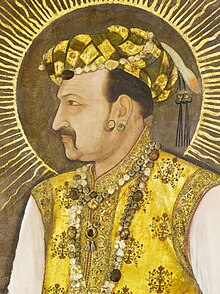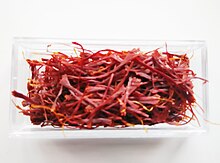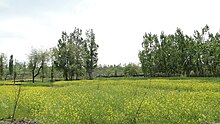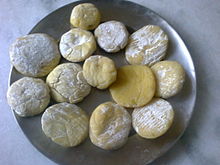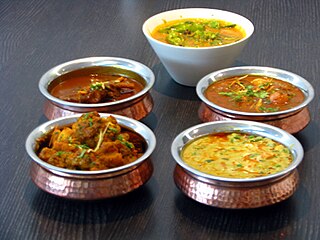
Curry is a dish with a sauce seasoned with spices, mainly associated with South Asian cuisine. It is not to be confused with leaves from the curry tree, though some curries do include curry leaves. Curry is also found in the native cuisines of many South East Asian and East Asian countries due to ancient contact with South Asia.
Indian cuisine consists of a variety of regional and traditional cuisines native to the Indian subcontinent. Given the diversity in soil, climate, culture, ethnic groups, and occupations, these cuisines vary substantially and use locally available spices, herbs, vegetables, and fruits.

Pakistani cuisine can be characterized as a blend of regional cooking styles and flavours from across South, Central and Western Asia. Pakistani cuisine is influenced by Persian, Indian, and Arab cuisine. The cuisine of Pakistan also maintains certain Mughal influences within its recipes and cooking techniques. Pakistan's ethnic and cultural diversity, diverse climates, geographical environments, and availability of different produce lead to diverse regional cuisines.

Rogan josh, also spelled roghan josh or roghan ghosht, is an aromatic curried meat dish originating from Kashmir.

Pilaf, pilav or pilau is a rice dish, or in some regions, a wheat dish, whose recipe usually involves cooking in stock or broth, adding spices, and other ingredients such as vegetables or meat, and employing some technique for achieving cooked grains that do not adhere to each other.

Biryani is a mixed rice dish, mainly popular in South Asia. It is made with rice, some type of meat and spices. To cater to vegetarians, in some cases, it is prepared by substituting vegetables for the meat. Sometimes eggs and/or potatoes are also added.

Hyderabadi biryani is a style of biryani originating from the kitchens of the Nizams of the erstwhile Hyderabad State with basmati rice and meat. Originating in the kitchens of the Nizam of Hyderabad, it combines elements of Hyderabadi and Mughlai cuisines. Hyderabad biryani is a key dish in Hyderabadi cuisine and it is so famous that the dish is considered synonymous with the city of Hyderabad.

Levantine cuisine is the traditional cuisine of the Levant, in the sense of the rough area of former Ottoman Syria. The cuisine has similarities with Egyptian cuisine, North African cuisine and Ottoman cuisine. It is particularly known for its meze spreads of hot and cold dishes, most notably among them ful medames, hummus, tabbouleh and baba ghanoush, accompanied by bread.

Afghan cuisine is influenced to a certain extent by Persian, Central Asian and Indian cuisines due to Afghanistan's close proximity and cultural ties. The cuisine is halal and mainly based on mutton, beef, poultry and fish with rice and Afghan bread. Accompanying these are common vegetables and dairy products, such as milk, yogurt, and whey, and fresh and dried fruits such as apples, apricots, grapes, bananas, oranges, plums, pomegranates, sweet melons, and raisins. The diet of most Afghans revolves around rice-based dishes, while various forms of naan are consumed with most meals. Tea is generally consumed daily in large quantities, and is a major part of hospitality. The culinary specialties reflect the nation's ethnic and geographic diversity. The national dish of Afghanistan is Kabuli palaw, a rice dish cooked with raisins, carrots, nuts, and lamb or beef.

Hyderabadi cuisine, also known as Deccani cuisine, is the native cooking style developed in the kitchens of the Muslim aristocrats of the erstwhile Hyderabad State, India. The haute cuisine of Hyderabad began to develop after the foundation of the Bahmani Sultanate, and the Qutb Shahi dynasty centered in the city of Hyderabad promoted the native cuisine along with their own. Hyderabadi cuisine had become a princely legacy of the Nizams of Hyderabad as it began to further develop under their patronage.

The cuisine of Bahrain consists of dishes such as biryani, harees, khabeesa, machboos, mahyawa, quzi and zalabia. Arabic coffee (qahwah) is the national beverage.

Kuwaiti cuisine is a fusion of Arabian, Iranian, Indian and Mediterranean cuisines. Kuwaiti cuisine is part of the Eastern Arabian cuisine. A prominent dish in Kuwaiti cuisine is machboos, a rice-based dish usually prepared with basmati rice seasoned with spices, and chicken or mutton.

Mughlai cuisine consists of dishes developed or popularised in the early-modern Indo-Persian cultural centres of the Mughal Empire. It represents a combination of cuisine of the Indian subcontinent with the cooking styles and recipes of Central Asian and Islamic cuisine. Mughlai cuisine is strongly influenced by the Turkic cuisine of Central Asia, the region where the early Mughal emperors originally hailed from, and it has in turn strongly influenced the regional cuisines of Northern India, Pakistan and Bangladesh.

Saffron is a key seasoning, fragrance, dye, and medicine in use for over three millennia. One of the world's most expensive spices by weight, saffron consists of stigmas plucked from the vegetatively propagated and sterile Crocus sativus, known popularly as the saffron crocus. The resulting dried stigmas, also known as "threads", are distinguished by their bitter taste, hay-like fragrance, and slight metallic notes. The saffron crocus is unknown in the wild; its most likely precursor, Crocus cartwrightianus, originated in Crete or Central Asia; The saffron crocus is native to Southwest Asia and was first cultivated in what is now Greece.
Awadhi cuisine is a cuisine native to the Awadh region in Northern India and Southern Nepal. The cooking patterns of Lucknow are similar to those of Central Asia, the Middle East, and Northern India and western India with the cuisine comprising both vegetarian and non-vegetarian dishes. The Awadh region has been influenced by Mughal cooking techniques, and the cuisine of Lucknow bears similarities to those of Central Asia, Kashmir, Punjab and Hyderabad. The city is also known for its Nawabi foods.
Bihari cuisine is eaten mainly in the eastern Indian state of Bihar, as well as in the places where people originating from the state of Bihar have settled: Jharkhand, Eastern Uttar Pradesh, Bangladesh, Nepal, Mauritius, South Africa, Fiji, some cities of Pakistan, Guyana, Trinidad and Tobago, Suriname, Jamaica, and the Caribbean. Bihari cuisine includes Angika cuisine, Bhojpuri cuisine, Maithil cuisine and Magahi cuisine.

Wazwan is a multi-course meal in Kashmiri cuisine, originating from Kashmir.

Malaysian Indian cuisine, or the cooking of the ethnic Indian communities in Malaysia, consists of adaptations of authentic dishes from India, as well as original creations inspired by the diverse food culture of Malaysia. Because the vast majority of Malaysia's Indian community are of South Indian descent, and are mostly ethnic Tamils who are descendants of immigrants from a historical region which consists of the modern Indian state of Tamil Nadu and Sri Lanka's Northern Province, much of Malaysian Indian cuisine is predominantly South Indian inspired in character and taste. A typical Malaysian Indian dish is likely to be redolent with curry leaves, whole and powdered spice, and contains fresh coconut in various forms. Ghee is still widely used for cooking, although vegetable oils and refined palm oils are now commonplace in home kitchens. Before a meal it is customary to wash hands as cutlery is often not used while eating, with the exception of a serving spoon for each respective dish.

The Thalassery cuisine refers to the distinct cuisine from Thalassery city of northern Kerala, which has blended in Arabian, Persian, Indian and European styles of cooking as a result of its long history as a maritime trading post.










